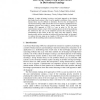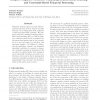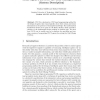191 search results - page 5 / 39 » Adapting Mathematical Domain Reasoners |
EWCBR
1993
Springer
14 years 1 hour ago
1993
Springer
A major advantage in using a case-based approach to developing knowledge-based systems is that it can be applied to problems where a strong domain theory may be difficult to determ...
AISC
1998
Springer
14 years 4 days ago
1998
Springer
The use of computer algebra is usually considered beneficial for mechanised reasoning in mathematical domains. We present a case study, in the application domain of coding theory, ...
ICML
2004
IEEE
14 years 8 months ago
2004
IEEE
Reminder systems support people with impaired prospective memory and/or executive function, by providing them with reminders of their functional daily activities. We integrate tem...
CLIMA
2006
13 years 9 months ago
2006
FLUX is a declarative, CLP-based programming method for the design of agents that reason logically about their actions and sensor information in the presence of incomplete knowledg...
GECCO
2006
Springer
13 years 11 months ago
2006
Springer
Adaptive Random Testing subsumes a class of algorithms that detect the first failure with less test cases than Random Testing. The present paper shows that a "reference metho...



